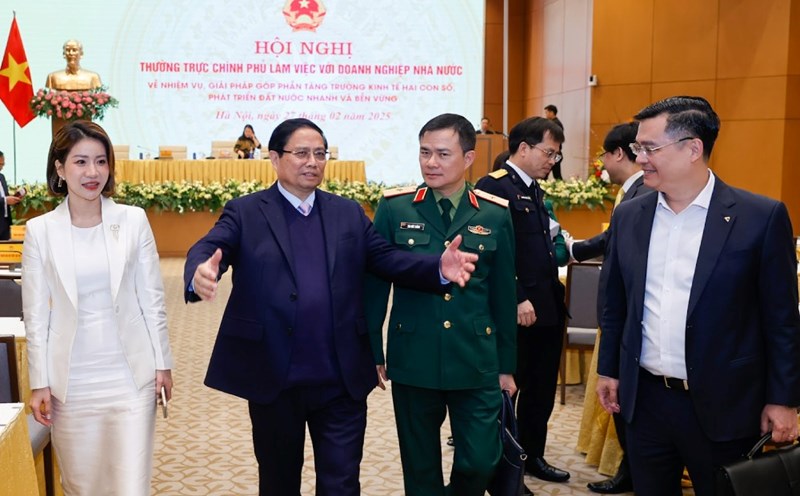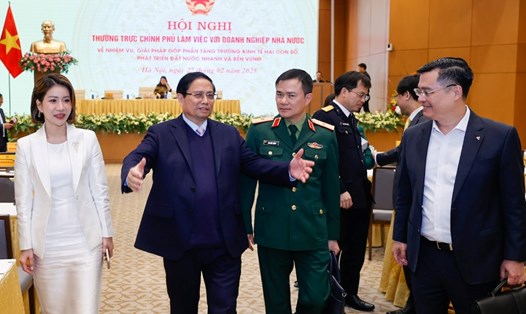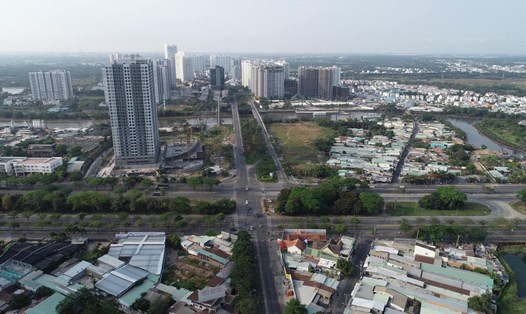On the afternoon of February 27, Politburo member and Prime Minister Pham Minh Chinh chaired a Permanent Government Conference working with Vietnamese small and medium enterprises (MSEs).
In his concluding remarks, the Prime Minister outlined a number of orientations and solutions for employees so that agencies and businesses can think and work together.
Firstly, employees must effectively and efficiently contribute to implementing the policies and guidelines issued by the Party and State to develop employees as desired according to the set goals, especially in developing the digital economy, green economy, circular economy, sharing economy, knowledge economy, promoting innovation.
Second, employees should promote national spirit, self-reliance, self-reliance, proactiveness, and creativity to rise up and overcome their own limits to develop higher, from employees to large enterprises.
Third, employees actively and effectively participate in research, construction, and improvement of institutions suitable to the market economy and the country's reality, starting from practice to propose solutions to remove difficulties and obstacles that are currently encountered.
Fourth, employees effectively exploit the country's resources and especially human resources.
Fifth, employees promote international cooperation, technology transfer, management science, mobilize capital from outside, participate in the country's integration process, participate in the global value chain, diversify markets, products, and supply chains.
Sixth, employees should further promote social security, hunger eradication and poverty reduction, participate in building social housing, especially for young people, the disadvantaged, low-income people, and eliminate temporary and dilapidated houses in 2025.
On the side of the Government and ministries and branches, the Prime Minister stated that it is necessary to study and propose the development of a new central resolution on private enterprises and state-owned enterprises, then institutionalize and organize implementation well.
In terms of institutions, focus on removing institutional bottlenecks to mobilize and effectively use all resources, taking the leading State resources, and activating social resources.
Cut all cumbersome procedures, resolutely eliminate the mechanism of asking and giving that creates negativity; reduce inconvenience, harassment, reduce compliance costs for businesses and people; promote decentralization, delegation of authority, strengthen supervision and inspection.
The Prime Minister also noted that economic and civil relations should not be criminatized, but if there are violations of criminal laws such as tax evasion, smuggling, counterfeit goods, counterfeit goods, etc., they must be strictly handled.
Another content is to keep interest rates stable. Analyzing further this content, the Prime Minister said that resources for businesses related to monetary policy and fiscal policy, ministries and branches must work with the Government to carry out a number of tasks and solutions based on businesses' proposals and comments.
Regarding monetary policy, the general direction of the Government is to be proactive, active, appropriate, flexible and effective; prioritize growth but control inflation.
Banks must comply with the direction of the State Bank, reduce costs, sacrifice part of benefits to share with people and businesses, apply technology, and cut procedures to reduce lending interest rates.
The Prime Minister requested the State Bank and the Ministry of Finance to implement policy tools to contribute to stabilizing interest rates, supporting people and businesses to develop long-term.
At the same time, the State Bank will remove difficulties for banks, including the proposal to legalize Resolution No. 42/2017/QH14 dated June 21, 2017 on piloting the handling of bad debts of credit institutions.











